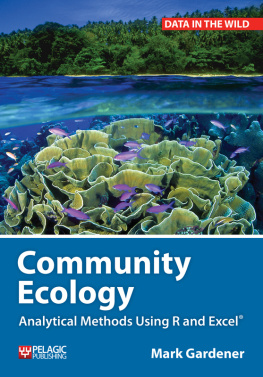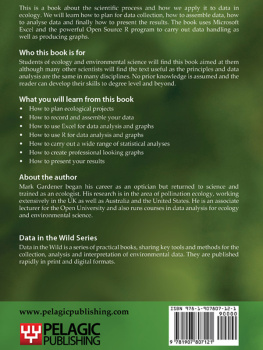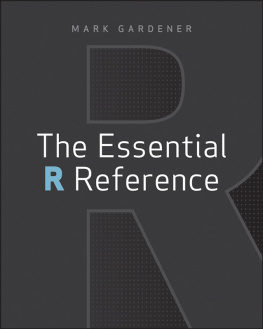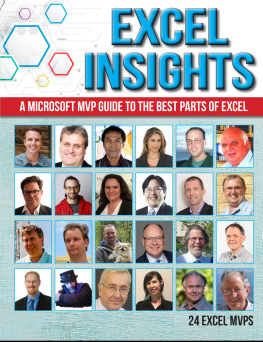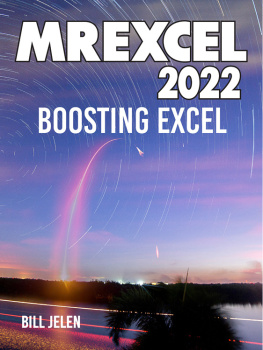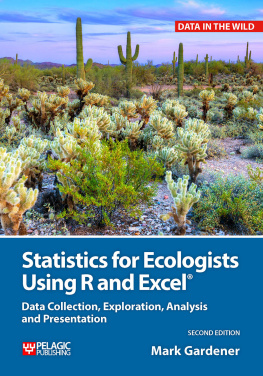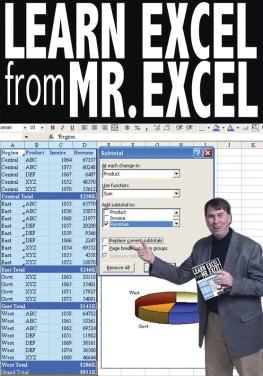Gardener - Community ecology : analytical methods using R and Excel®
Here you can read online Gardener - Community ecology : analytical methods using R and Excel® full text of the book (entire story) in english for free. Download pdf and epub, get meaning, cover and reviews about this ebook. City: Exeter, year: 2014, publisher: Pelagic Publishing, genre: Romance novel. Description of the work, (preface) as well as reviews are available. Best literature library LitArk.com created for fans of good reading and offers a wide selection of genres:
Romance novel
Science fiction
Adventure
Detective
Science
History
Home and family
Prose
Art
Politics
Computer
Non-fiction
Religion
Business
Children
Humor
Choose a favorite category and find really read worthwhile books. Enjoy immersion in the world of imagination, feel the emotions of the characters or learn something new for yourself, make an fascinating discovery.
- Book:Community ecology : analytical methods using R and Excel®
- Author:
- Publisher:Pelagic Publishing
- Genre:
- Year:2014
- City:Exeter
- Rating:5 / 5
- Favourites:Add to favourites
- Your mark:
- 100
- 1
- 2
- 3
- 4
- 5
Community ecology : analytical methods using R and Excel®: summary, description and annotation
We offer to read an annotation, description, summary or preface (depends on what the author of the book "Community ecology : analytical methods using R and Excel®" wrote himself). If you haven't found the necessary information about the book — write in the comments, we will try to find it.
Gardener: author's other books
Who wrote Community ecology : analytical methods using R and Excel®? Find out the surname, the name of the author of the book and a list of all author's works by series.
Community ecology : analytical methods using R and Excel® — read online for free the complete book (whole text) full work
Below is the text of the book, divided by pages. System saving the place of the last page read, allows you to conveniently read the book "Community ecology : analytical methods using R and Excel®" online for free, without having to search again every time where you left off. Put a bookmark, and you can go to the page where you finished reading at any time.
Font size:
Interval:
Bookmark:

Published by Pelagic Publishing
www.pelagicpublishing.com
PO Box 725, Exeter, EX1 9QU
Community Ecology
Analytical Methods Using R and Excel
ISBN 9781907807619 (Pbk)
ISBN 9781907807626 (Hbk)
ISBN 9781907807633 (ePub)
ISBN 9781907807657 (PDF)
ISBN 9781907807640 (Mobi)
Copyright 2014 Mark Gardener
All rights reserved. No part of this document may be produced, stored in a retrieval system, or transmitted in any form or by any means, electronic, mechanical, photocopying, recording or otherwise without prior permission from the publisher.
While every effort has been made in the preparation of this book to ensure the accuracy of the information presented, the information contained in this book is sold without warranty, either express or implied. Neither the author, nor Pelagic Publishing, its agents and distributors will be held liable for any damage or loss caused or alleged to be caused directly or indirectly by this book.
Windows, Excel and Word and are trademarks of the Microsoft Corporation. For more information visit www. microsoft.com. OpenOffice.org is a trademark of Oracle. For more information visit www.openoffice.org. LibreOffice is a trademark of The Document Foundation. For more information visit www.libreoffice.org. Apple Macintosh is a trademark of Apple Inc. For more information visit www.apple.com.
British Library Cataloguing in Publication Data
A catalogue record for this book is available from the British Library.
Cover image: Over under water picture, showing Fairy Basslets (Pseudanthias tuka) amongst Cabbage Coral (Turbinaria reniformis) and tropical island in the background. Indo Pacific. David Fleetham/OceanwideImages.com
Typeset by Swales & Willis Ltd, Exeter, Devon, UK
Mark Gardener (www.gardenersown.co.uk) is an ecologist, lecturer and writer working in the UK. His primary area of research was in pollination ecology and he has worked in the UK and around the world (principally Australia and the United States). Since his doctorate he has worked in many areas of ecology, often as a teacher and supervisor. He believes that ecological data, especially community data, are the most complicated and ill-behaved and are consequently the most fun to work with. He was introduced to R by a like-minded pedant whilst working in Australia during his doctorate. Learning R was not only fun but opened up a new avenue, making the study of community ecology a whole lot easier. He is currently self-employed and runs courses in ecology, data analysis and R for a variety of organisations. Mark lives in rural Devon with his wife Christine, a biochemist who consequently has little need of statistics.
There are so many people to thank that it is hard to know where to begin. I am sure that I will leave some people out, so I apologise in advance. Thanks to Richard Rowe (James Cook University) for inspiring me to use R. Data were contributed from various sources, especially from MSc students doing Biological Recording; thanks especially to Robin Cure, Jessie MacKay, Mark Latham, John Handley and Hing Kin Lee for your hard-won data. The MSc programme helped me to see the potential of proper biological records and I thank Sarah Whild for giving me the opportunity to undertake some teaching on the course. Thanks also to the Field Studies Council in general: many data examples have arisen from field courses Ive been involved with.
Several versions of Microsofts Excel spreadsheet were used in the preparation of this book. Most of the examples presented show version 2007 for Microsoft Windows although other versions may also be illustrated.
The main version of the R program used was 2.12.1 for Macintosh: The R Foundation for Statistical Computing, Vienna, Austria, ISBN 3-900051-07-0, http://www.R-project.org/. Other versions were used in testing code.
Free support material is available on the Community Ecology companion website, which can be accessed via the books resources page: http://www.pelagicpublishing.com/community-ecology-resources.html
We welcome feedback from readers please email us at and tell us what you thought about this book. Please include the book title in the subject line of your email.
We publish scientific books to the highest editorial standards in all life science disciplines, with a particular focus on ecology, conservation and environment. Pelagic Publishing produces books that set new benchmarks, share advances in research methods and encourage and inform wildlife investigation for all.
If you are interested in publishing with Pelagic please contact with a synopsis of your book, a brief history of your previous written work and a statement describing the impact you would like your book to have on readers.
Interactions between species are of fundamental importance to all living systems and the framework we have for studying these interactions is community ecology. This is important to our understanding of the planets biological diversity and how species interactions relate to the functioning of ecosystems at all scales. Species do not live in isolation and the study of community ecology is of practical application in a wide range of conservation issues.
The study of ecological community data involves many methods of analysis. In this book you will learn many of the mainstays of community analysis including: diversity, similarity and cluster analysis, ordination and multivariate analyses. This book is for undergraduate and postgraduate students and researchers seeking a step-by-step methodology for analysing plant and animal communities using R and Excel.
Microsofts Excel spreadsheet is virtually ubiquitous and familiar to most computer users. It is a robust program that makes an excellent storage and manipulation system for many kinds of data, including community data. The R program is a powerful and flexible analytical system able to conduct a huge variety of analytical methods, which means that the user only has to learn one program to address many research questions. Its other advantage is that it is open source and therefore free. Novel analytical methods are being added constantly to the already comprehensive suite of tools available in R.
This book is intended to give you some insights into some of the analytical methods employed by ecologists in the study of communities. The book is not intended to be a mathematical or theoretical treatise but inevitably there is some maths! Ive tried to keep this in the background and to focus on how to undertake the appropriate analysis at the right time. There are many published works concerning ecological theory; this book is intended to support them by providing a framework for learning how to analyse your data.
The book does not cover every aspect of community ecology. There are a few minor omissions I hope to cover some of these in later works.
There are four main strands to scientific study: planning, recording, analysis and reporting. The first few chapters deal with the planning and recording aspects of study. You will see how to use the main software tools, Excel and R, to help you arrange and begin to make sense of your data. Later chapters deal more explicitly with the grand themes of community ecology, which are:
Next pageFont size:
Interval:
Bookmark:
Similar books «Community ecology : analytical methods using R and Excel®»
Look at similar books to Community ecology : analytical methods using R and Excel®. We have selected literature similar in name and meaning in the hope of providing readers with more options to find new, interesting, not yet read works.
Discussion, reviews of the book Community ecology : analytical methods using R and Excel® and just readers' own opinions. Leave your comments, write what you think about the work, its meaning or the main characters. Specify what exactly you liked and what you didn't like, and why you think so.

